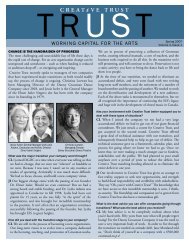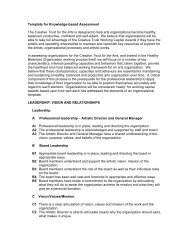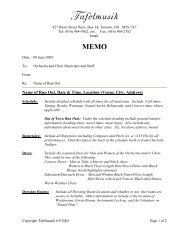20 Questions - Canadian Institute of Chartered Accountants
20 Questions - Canadian Institute of Chartered Accountants
20 Questions - Canadian Institute of Chartered Accountants
You also want an ePaper? Increase the reach of your titles
YUMPU automatically turns print PDFs into web optimized ePapers that Google loves.
Values are important when decisions must be made – even if the subject is not<br />
covered by laws or regulations. Some examples: some organizations will not<br />
accept grants or donations from sources with whose activities or positions they<br />
disagree, and groups that organize sports programs for young children may<br />
promote cooperation, learning and fun over competition and winning.<br />
Recommended practices<br />
• The organization has a statement <strong>of</strong> its values<br />
• The organization’s strategies are consistent with its values<br />
• The board approves the values and (where appropriate) the code <strong>of</strong> conduct<br />
• The values and code are communicated to staff, volunteers, members and<br />
other stakeholders<br />
See CICA’s <strong>20</strong> <strong>Questions</strong> Directors Should Ask about Codes <strong>of</strong> Conduct<br />
Values<br />
<strong>Canadian</strong> Red Cross<br />
Integrity and accountability<br />
Ethical practices<br />
Quality<br />
Caring and compassion<br />
Client-focused<br />
Responsiveness<br />
Manitoba Theatre Centre<br />
Quality and Balance. Quality is reflected in the writing <strong>of</strong> each play<br />
and in the actors, directors and designers who create them. Balance<br />
is evident in the variety <strong>of</strong> our playbill.<br />
4. Who are the organization’s key stakeholders<br />
and what do they expect? 3<br />
Who are we trying to serve? Who provides our funding? Who works with us or<br />
for us?<br />
Many people and organizations (“stakeholders”) can be involved in not-forpr<strong>of</strong>it<br />
organizations. These can include:<br />
• The clients or customers who benefit from the activities<br />
• The members – the “owners” or supporters <strong>of</strong> the organization<br />
• The executive director, general manager or chief executive <strong>of</strong>ficer<br />
• Employees<br />
• Volunteers<br />
• Partners<br />
• Funding agencies – including government and private foundations<br />
• Donors<br />
• Business sponsors<br />
• The community in which the organization operates<br />
The success <strong>of</strong> a not-for-pr<strong>of</strong>it organization <strong>of</strong>ten depends on identifying and<br />
having good relationships with its key stakeholders and meeting their expectations.<br />
This can be challenging when the expectations vary among stakeholders<br />
or are not compatible with the interests <strong>of</strong> the organization. Boards must be<br />
sure that their organization understands and respects stakeholder expectations<br />
but does not let them override its values and strategy. For example: an<br />
organization may find it necessary to decline a generous <strong>of</strong>fer <strong>of</strong> a donation<br />
from a long-time supporter if the money would come with conditions that are<br />
incompatible with the organization’s values.<br />
Recommended practices<br />
• The organization has identified its key stakeholders<br />
• The strategy addresses stakeholder needs<br />
3 The material in this question is taken from CICA’s <strong>20</strong> <strong>Questions</strong> Directors <strong>of</strong> Not-for-pr<strong>of</strong>it Organizations<br />
Should Ask about Governance (Question 4).<br />
7












